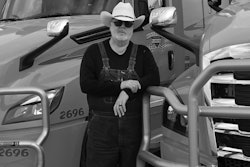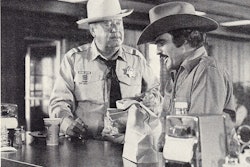I have written here before about this struggle -- namely, truckers dealing with mental health issues and isolation, and how that can lead to burnout and increased accident risk, job dissatisfaction, declining achievement, even poor health.
After three years trucking and following a divorce, in 1996 I packed everything I owned, put it in storage and climbed into my truck. I was essentially homeless for the next nine years.
Yes, your heard that right. Homeless. I remained homeless and held only a P.O. Box for an address. Though I did not know it at the time, I had some major mental health issues. In 2007 I was finally diagnosed with chronic PTSD (post-traumatic stress disorder). Some of the symptoms of PTSD are depression and anxiety, and the isolation of trucking amplified these symptoms, leading to some very dark times.
[Related: You are not alone in the fight against mental health]
Up until ’96, I had for years self-medicated the PTSD. It worked to an extent, but of course it was an unhealthy temporary fix that did not mix with trucking. Before I became homeless, I had checked myself into treatment and, thanks to the VA, got clean for the first time in almost 25 years. Still, the first couple years of my homelessness the PTSD went unchecked and untreated. I was a very private person when it came to my past and the hell I was raised in. Because I was a Marine, surrender was not part of my mentality. I believed that it was my fight, and my fight alone.

When I say I went through some very dark times it is truly an understatement. I had no spiritual foundation. I had always been an extreme risk-taker with underlying suicidal tendencies -- another symptom of PTSD -- and I began to push, doing more than a thousand miles in a day yet never outrunning the darkness.
After two years in it, I found my way to Christ in 1998. My fight was far from over, though. After pastoral counseling I finally sought out medical treatment for my depression. One of the side effects of depression medication is drowsiness and fatigue. I had no choice but to run legal and sleep, so I began to try to understand more about what I was fighting.
Scripture helped a great deal, and without trying I became something of a theologian, spending hours in Scripture daily and sharing what I had learned. Not on fire, as is often seen with some new believers, but with an analytical approach that just laid out facts. I also began to dive into the psychology of depression to attempt to understand and stock my battle bag with more weapons I could use in my fight.
Being homeless and on the road, I had no access to weekly counseling but made use of my VA benefits and worked with a very caring counselor once every three months when I went in for a refill of my medication. Using some cognitive behavioral techniques, she was able to help me fill my battle bag, but there was just so far she could take me.
Eventually our sessions ended, and soon after I quit refilling my prescription.
Psychotropic medications should not be stopped cold turkey.
Yet still I could make use of pastoral counseling when I was able to get to a church. I continued my dives into theology and psychology, switching my mailing address to that of a family member. Once a month I cycled through, unloaded about 200 lbs. of books and picked up another 200 lbs. for the next month.
This learning taught me how to battle my demons, how to stay clean, and how to finally find the peace I sought. Without discounting the spiritual journey, I would like to share the psychological journey and offer you some suggestions and tips you may need if fighting the same fight.
[Related: The heart of a trucker -- a chance to make a stand against child abuse]
The following is partly based on advice found at MentalHealth.org:
Exercise. Regular exercise may be a difficult task for truckers to accomplish, though it’s of course not impossible. Exercise produces endorphins in the brain -- natural pain killers that can help deal with the chemical imbalances often treated with medications. Endorphins can improve your mood and sleep, and reduce tension in the body.
Even a 10-minute walk can have the same effect on endorphins as a 45-minute workout, though it may not be as long lasting.
Learn to recognize, and acknowledge, your emotions. Remember I said you will have to question yourself, your truths? This begins with honest evaluation and challenging your emotions. This is being mindful of your feelings and what triggered the feelings -- not nullifying them. Remember: no one can make you feel anything. What you feel is a choice.
When you have an emotional reaction, locate the underlying reason for it. Once you know the trigger, you can decide if you truly need to load the gun. Avoid self-defeating labels like crazy or stupid. Don’t berate yourself. When you experience an overwhelming feeling, don’t second-guess why, just identify that underlying reason, control your response, and set it aside until the emotion has passed so you can do an honest evaluation. If you have to, step outside of yourself. Take the perspective you’d take with a loved one going through something similar.
You will have to learn how to be self-compassionate. Honesty without compassion is cruelty, and compassion will light the way out of the darkness.
This brings us to self-acceptance. This can be the hardest part of the battle, but the truth is everyone has a burden to carry. We all fight demons and find ourselves in the darkness of the valley at times. There are no magic pills. Self-acceptance does not mean being content where you are in your journey of self. It means accepting yourself where you are, knowing you are working to become better.
Depression is often described as going through that valley of darkness, giving the impression the only way out is to climb the hill out of the shadow of the mountain to find the daylight. But mountain peaks are just part of the expedition, and rarely the end. Mountains are always surrounded by foothills and valleys that must be traversed to reach the base, where the real climb begins.
Psychology, I feel, can get you through those, but the final ascent to peace at the top I found only through the spiritual side. For me, the fight is in the climb, and trusting the path we are taking. It is always more difficult to climb a mountain in a straight path. Sometimes, a mountain climb requires a horizontal-angle approach -- you often need to zig zag back and forth, yet always ascending. Be kind to yourself, lift your eyes to the summit occasionally so you do not lose sight of the peak, and take each step bravely.
The cognitive behavioral techniques I mentioned work, but they take time, vigilance, and practice. You will need some guidance to achieve the results you seek, because it is very easy to fall back into old habits. And while you can find the wellness you are searching for, maintaining it is hard work. Staying on an even keel is about all you can hope for without taking your own spiritual journey as well, I feel.
To reach that point you must pay attention to what you eat and what you think, and honestly evaluate how you are daily. You will have to brave the darkness inside to fight your demons, because demons do not come into the light. It is the bravest journey you will ever take because you have to question self-truths, habits, tendencies.
Finally, don't worry when you are in the valley, because when you are at rock bottom there is only one way to go -- up. When you reach the peak, remember the struggle and what it took to get there, and help others achieve the same.











